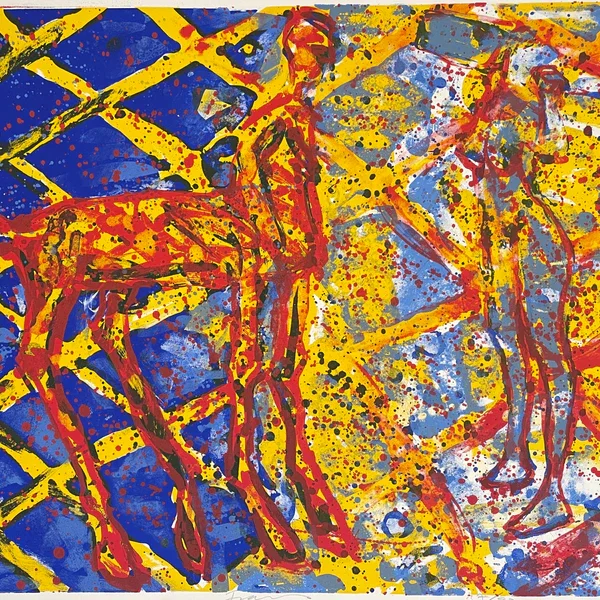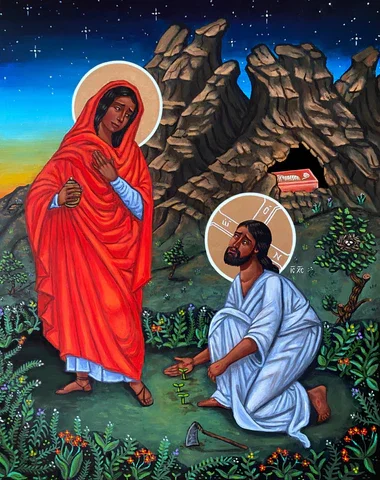The Lord’s Prayer meets modern and postmodern consciousness
Frans Widerberg, To kentaurer
I recently attended a workshop on prayer. I want to use that experience to complete my discussion of the major stages of consciousness (according to integral theory) and their application to Christianity. Yes, stages of consciousness progress beyond the modern and postmodern. I hope to say a few words about that on a blog, soon, too. But for the most part, modernity and postmodernity are the most ‘current’ stages in the world today.
Only the very committed will remember me beginning this thread. It has been a while. I am quite reconciled to the idea that writing this blog has been primarily for me. My adult ‘rediscovery of Christianity’ is about to reach an important milestone. I will blog again when that occurs.
I began this ‘consciousness’ thread writing about “The journey of consciousness: departure”, “Coming to the journey of consciousness through Christianity”, and used John Constable’s “Dedham Vale, 1802 and 1828” to visualize expansive, developmental shifts. I then introduced “the integral model” of consciousness, and cautiously considered the idea of stages of consciousness and churches, a sort of Jacob’s Ladder of the soul.
William Blake, Jacob’s Ladder or Jacob’s Dream (1799-1806)
To very briefly summarize the integral model: Ken Wilber and others have suggested that consciousness evolves through various stages. One way of visualizing this journey is Steve McIntosh’s “spiral development”:
Applying Wilber’s integral model to Christianity, Paul Smith argued that we can observe a different form of Christian consciousness and ‘church’ at each stage. He begins with “tribal church,” on the second level of McIntosh’s spiral.
In an earlier post, I tried sketching out “primal” or “archaic consciousness” as applied to Christianity. In subsequent posts, I looked at tribal conciousness and tribal church, warrior consciousness, and the leap to the traditional level. Now back to the workshop on prayer…
It occurred in a Christian setting, but with a group and in a denomination thoroughly soaked through with modern and postmodern consciousness.
Although the workshop presenter was interested in exploring ‘prayer’ in a more everyday and mysterious sense, he also had us consider more traditional prayer forms. We were asked to discuss ‘the Lord's Prayer’, and our responses to it, in small groups.
Our Father who art in heaven, hallowed be thy name. Thy kingdom come, Thy will be done on earth, as it is in heaven. Give us this day our daily bread. And forgive us our debts, as we forgive our debtors. And lead us not into temptation, but deliver us from evil. (1)
One group responded: “This is the most patriarchal prayer in the world!” They added: “It doesn't get any better if you change it to Our Mother!”
Another group reported that while its members rarely use this wording when they pray at home, at certain times in their lives, it has been helpful. For example, at a difficult transition in one person’s life, they found it very comforting to pray these familiar words out loud each night.
Another group suggested that the Lord’s Prayer isn’t very helpful insofar as it is always turning our attention ‘up’ and ‘out’ - to an almighty being in a heaven that feels distantly separated from our earth and humanity, to ‘an old man in the clouds’, for many - rather than helping us turn more deeply inward for divine encounter and guidance. This may in part be due to the particular language version that was used. However, they also felt that the prayer contained ideas that are significant and powerful - such as searching to discern God’s will, rather than our smaller, more self-centered will, in knowing how to act and live.
One of my own responses at the time (and that I’m glad I didn't share out loud) was to think: Jesus said many different things about prayer. In one passage, he counsels a sort of private, almost contemplative practice - the ‘prayer in secret’. In another, he offers something more expectant and dialogical: ‘Ask and receive, search and find, knock and the door will be opened’. I once read an author who argued that Jesus offered the Lord’s Prayer not as some universal model on how everyone should pray, but to meet the specific demands of his disciples. Just like the followers of other charismatic spiritual teachers, they probably longed for their own special prayer words and form.
What all these responses have in common is the idea that traditional Christian forms and language need to be carefully handled and often updated so as to better reflect our ongoing experience of God, life, the world, and each other. For example, although women were central to Jesus's life, and were included in his ministry in often shocking, liberating ways, men have dominated Christian leadership and theology. We need to apply a “hermeneutic of suspicion”, postmoderns would say, as we discern the spiritual meaning and value of any Christian “text”. Why is the Creator of the Heavens and Earth (and humanity) always represented as a man, or in male gendered language? And what impact does that have on women who are supposedly made in the image of this creator, and on patterns of power and abuse in society and the church?
Kelly Latimore, Mary Magdalene and Christ the Gardener
The ‘modern church’ is one that is committed to truth, and thus welcomes and integrates modern advances in knowledge - be these scientific, historical, linguistic or psychological etc. Postmodern consciousness, in turn, submits the modern search for truth to further critique. It argues that all truth is created by specific communities and ‘discourses of power’, and this significantly conditions what is produced, and what we come to believe as real.
‘The modern church’ represents an important progression from traditional church. It allows its members to explore and question the breadth and mystery of God, using the fullness of their intellect and life experience, making important changes to belief and church practice in the process (such as supporting women into church leadership). God keeps revealing the fullness of truth. Our minds aren’t ‘capped’ at internalizing and submitting to so-called orthodox or traditional ‘law’. God is bigger, more surprising, and robust than we have often been led to believe. Our appreciation of the mystery of life and consciousness continues to expand and grow.
But modern consciousness has also, arguably, placed too great an emphasis on intellectual development and individual experience, and to the detriment of other ways of knowing and being, including embodied knowledge, spiritual experience, communal existence, and ecological perspectives. ‘Modern churches’ aren’t just so-called liberal, progressive ones. Contemporary conservative churches, from the time of the Reformation, are often heavily rational and ‘head-based’ in their approaches to Christianity and God.
‘Postmodern church’, if one can use such a phrase, is generally marked by an interest in what modernity lacks, has suppressed, or forgotten. There may be a greater openness to traditional knowledge and more interest in ritual and contemplative spirituality, for example, as well as an embrace of new perspectives, values, technology, and diversity. Churches infused with this ‘spirit’ can be quite eclectic and more open-ended. One might find classes on ‘the Jesus Prayer’ and Marian devotion alongside yoga sessions, discussions of angels and ‘subtle energies’, and experimental online church services, or services held outdoors in, say, a forest.
Reverend Rachael Phillips, an ordained Anglican priest and leader of the Mary Magdalene Community Church, Chopwell Wood, U.K.
Because it moves beyond the strictly rational, postmodern consciousness may open us to more expanded states of consciousness. However, if we are too eclectic in our choosing, and lacking an authentic centre or centred community - if we haven’t sufficiently integrated and included previous stages, including, say, the tribal, traditional and modern levels - then our ego or personal self may become over-saturated, ungrounded, and easily overwhelmed. In trying to be everything, or appease everyone, we may lose the sense of a core identity and a core sense of spiritual guidance and discernment - a time tested way of ‘testing the spirits’ and discerning truth.
In Integral Christianity, Paul Smith argues:
Jesus never criticized any other religion. He was a good postmodern in that respect. On the other hand, he was devastatingly pointed in his criticism of his own religion. That was not very postmodern at all. He made clear distinctions between what he considered the best in his religion and the worst. (2)
He goes on:
I call the postmodern church “flat” because nothing rises higher than anything else. There sometimes seems to be an uncritical acceptance of all values and practices. Yet for all their inclusiveness, they are often angry at the tribal, traditional, and modern church. (3)
Frans Widerberg, Fuglemannen
Driving away from the prayer workshop, it suddenly occurred to me that we were all ‘wrong’ - or, perhaps better, that we were all heading down the wrong track with our reading of the Lord’s Prayer. Like traditionalists, we were taking the prayer literally. And that makes no spiritual sense to me. God as “Father”, so completely other and external to our being? Towering over us? With omnipotent power to lead us or lead us not into temptation? No wonder so few of us, in the prayer workshop, actually use this prayer at home. It makes us feel like serfs in bondage - or rebellion - to a great, all-powerful feudal lord. Hardly the basis for a relationship of love, intimacy, and trust.
But what if the Lord’s Prayer - like so many traditional religious forms - is a symbol for the soul’s journey, for the transformation of consciousness? What is its language of fealty and submission is culturally-specific, symbolic language for the ego’s surrender to Spirit?
References:
Matthew 6:9-16, modified King James’ Version.
Paul R. Smith, Integral Christianity: The Spirit’s Call to Evolve (2011), p.71.
Ibid.





